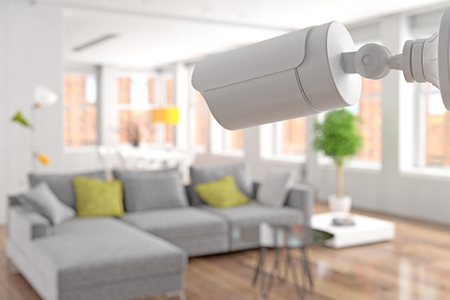Smile. You might be under surveillance.
Does seller-imposed surveillance cross an ethical line? Agents, brokers and consumers are divided, with opposing views regarding safety and invasion of privacy. Lou Nimkoff, president of the Orlando Regional REALTOR® Association, is seeing a growing concern in the industry related to homeowner-imposed surveillance. While many sellers prefer to keep an eye on their property when strangers are walking through, prospective buyers feel uncomfortable when being filmed, putting the transaction at risk.
“There is certainly an element of safety that can be attributed to surveillance cameras, such as for the protection of personal property during showings or personal protection during open houses,” says Nimkoff. “The risk is that the presence of a surveillance camera might scare off a potential buyer.”
In the era of the smart home, superfluous gadgetry largely goes unnoticed. It’s commonplace to have a Nest thermostat on the wall, an Amazon Echo sitting on a side table, or a refrigerator that displays its contents without having to physically open the door. How many times have agents and buyers walked by a nanny cam or security camera while unknowingly being recorded? At this point, it’s safer to assume that all homes have these devices.
“It’s always a good idea for buyers’ REALTORS® to coach their clients not to discuss home features or pricing during a showing, regardless of whether or not the presence of surveillance equipment has been disclosed,” Nimkoff says.
The National Association of REALTORS®’ (NAR) stance? Consumers must follow their state laws regarding surveillance, and REALTORS® must follow both government-imposed regulations and NAR’s Code of Ethics. NAR provides a state-by-state list of surveillance laws on its website.
The secret to keeping protected? Be proactive.
“Sellers, of course, are not bound to the REALTOR® Code of Ethics,” says Nimkoff. “Ethically for REALTORS®, it is recommended that the listing REALTOR® try to ensure that sellers disclose the presence of surveillance equipment and to place a notice in the ‘remarks’ section of the property’s MLS listing. It is also recommended that the buyer’s REALTOR® check both the seller’s disclosure and the listing remarks prior to showing a property and to inform the buyers of the presence of surveillance equipment. Failure to take these actions could result in a possible violation of the REALTOR® Code of Ethics.”
It’s tough to implement laws within the industry when these regulations not only differ according to state, but also according to recording method—especially if homeowners are recording sound. In Florida, for example, the disclosure of sound recording is mandatory, while video recording merely requires a sign alerting visitors or unconcealed equipment.
“In Florida, laws distinguish between video and sound recording,” Nimkoff says. “For sound recording, Florida law requires the consent of all parties (hence the need for disclosure by the seller and notification to the buyer). For video, the law requires a written notice, such as a sign at the front door. If a camera is immediately obvious, such as equipment hanging at the front door, a sign may not be necessary. Laws vary from state to state, so REALTORS® should check their own state’s statutes.”
Of course, ethical questions come into play in both scenarios. Sellers who simply film visitors without recording sound could open themselves up to Fair Housing violations if they refuse to accept an offer from a prospective buyer based on what they look like. When it comes to voice recording, anything the buyer says inside the home could be used to the advantage of the seller in negotiations.
“I’ve had sellers actually go and spy on buyers to see if they are the kind of people they want living in their house,” Janine Acquafredda, associate broker at House-N-Key Realty in New York, told Bankrate.com. “It’s curiosity, but also making sure the agent is pointing out things [the seller] thinks they should point out and speaking about the house the way [the seller] thinks they should be speaking about the house.”
Most states allow the use of surveillance equipment without disclosure as long as sound is not recorded and there is not a reasonable expectation of privacy, as with a bathroom. In this case, homeowners could argue that common spaces and bedrooms in are fair game for recording.
Is that curiosity worth the risk of alienating buyers or possible discrimination charges? Will sellers look to conceal these surveillance devices, even from their agents, in the name of safety?
 Liz Dominguez is RISMedia’s associate content editor. Email her your real estate news ideas at ldominguez@rismedia.com. For the latest real estate news and trends, bookmark RISMedia.com.
Liz Dominguez is RISMedia’s associate content editor. Email her your real estate news ideas at ldominguez@rismedia.com. For the latest real estate news and trends, bookmark RISMedia.com.




